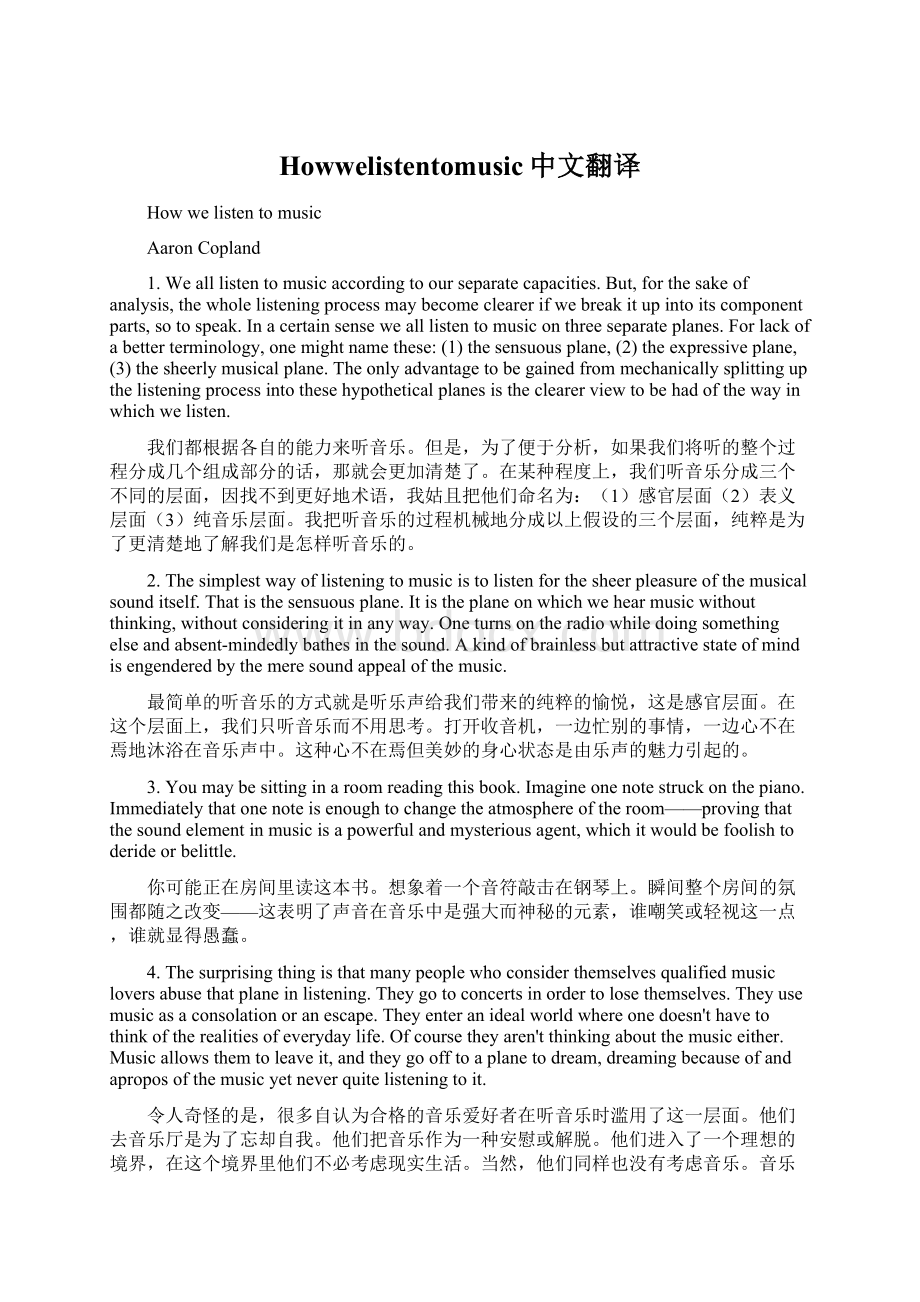 Howwelistentomusic中文翻译.docx
Howwelistentomusic中文翻译.docx
- 文档编号:4911024
- 上传时间:2022-12-11
- 格式:DOCX
- 页数:8
- 大小:27.48KB
Howwelistentomusic中文翻译.docx
《Howwelistentomusic中文翻译.docx》由会员分享,可在线阅读,更多相关《Howwelistentomusic中文翻译.docx(8页珍藏版)》请在冰豆网上搜索。

Howwelistentomusic中文翻译
Howwelistentomusic
AaronCopland
1.Wealllistentomusicaccordingtoourseparatecapacities.But,forthesakeofanalysis,thewholelisteningprocessmaybecomeclearerifwebreakitupintoitscomponentparts,sotospeak.Inacertainsensewealllistentomusiconthreeseparateplanes.Forlackofabetterterminology,onemightnamethese:
(1)thesensuousplane,
(2)theexpressiveplane,(3)thesheerlymusicalplane.Theonlyadvantagetobegainedfrommechanicallysplittingupthelisteningprocessintothesehypotheticalplanesistheclearerviewtobehadofthewayinwhichwelisten.
我们都根据各自的能力来听音乐。
但是,为了便于分析,如果我们将听的整个过程分成几个组成部分的话,那就会更加清楚了。
在某种程度上,我们听音乐分成三个不同的层面,因找不到更好地术语,我姑且把他们命名为:
(1)感官层面
(2)表义层面(3)纯音乐层面。
我把听音乐的过程机械地分成以上假设的三个层面,纯粹是为了更清楚地了解我们是怎样听音乐的。
2.Thesimplestwayoflisteningtomusicistolistenforthesheerpleasureofthemusicalsounditself.Thatisthesensuousplane.Itistheplaneonwhichwehearmusicwithoutthinking,withoutconsideringitinanyway.Oneturnsontheradiowhiledoingsomethingelseandabsent-mindedlybathesinthesound.Akindofbrainlessbutattractivestateofmindisengenderedbythemeresoundappealofthemusic.
最简单的听音乐的方式就是听乐声给我们带来的纯粹的愉悦,这是感官层面。
在这个层面上,我们只听音乐而不用思考。
打开收音机,一边忙别的事情,一边心不在焉地沐浴在音乐声中。
这种心不在焉但美妙的身心状态是由乐声的魅力引起的。
3.Youmaybesittinginaroomreadingthisbook.Imagineonenotestruckonthepiano.Immediatelythatonenoteisenoughtochangetheatmosphereoftheroom——provingthatthesoundelementinmusicisapowerfulandmysteriousagent,whichitwouldbefoolishtoderideorbelittle.
你可能正在房间里读这本书。
想象着一个音符敲击在钢琴上。
瞬间整个房间的氛围都随之改变——这表明了声音在音乐中是强大而神秘的元素,谁嘲笑或轻视这一点,谁就显得愚蠢。
4.Thesurprisingthingisthatmanypeoplewhoconsiderthemselvesqualifiedmusicloversabusethatplaneinlistening.Theygotoconcertsinordertolosethemselves.Theyusemusicasaconsolationoranescape.Theyenteranidealworldwhereonedoesn'thavetothinkoftherealitiesofeverydaylife.Ofcoursetheyaren'tthinkingaboutthemusiceither.Musicallowsthemtoleaveit,andtheygoofftoaplanetodream,dreamingbecauseofandaproposofthemusicyetneverquitelisteningtoit.
令人奇怪的是,很多自认为合格的音乐爱好者在听音乐时滥用了这一层面。
他们去音乐厅是为了忘却自我。
他们把音乐作为一种安慰或解脱。
他们进入了一个理想的境界,在这个境界里他们不必考虑现实生活。
当然,他们同样也没有考虑音乐。
音乐允许他们逃离现实,到另一个地方去做梦,因为音乐而做梦,做有关音乐的梦,却从没真正欣赏过音乐。
5.Yes,thesoundappealofmusicisapotentandprimitiveforce,butyoumustnotallowittousurpadisproportionateshareofyourinterest.Thesensuousplaneisanimportantoneinmusic,averyimportantone,butitdoesnotconstitutethewholestory.
的确,音乐的声音魅力是一种强大而原始的力量,但是千万不要让它不合比例地侵占你的兴趣。
感观层面是音乐中重要的一层——非常重要——但并不是音乐的全部。
6.Thereisnoneedtodigressfurtheronthesensuousplane.Itsappealtoeverynormalhumanbeingisselfevident.Thereis,however,suchathingasbecomingmoresensitivetothedifferentkindsofsoundstuff①asusedbyvariouscomposers.Forallcomposersdonotusethatsoundstuffinthesameway.Don'tgettheideathatthevalueofmusiciscommensuratewithitssensuousappealorthattheloveliestsoundingmusicismadebythegreatestcomposer.Ifthatwereso,RavelwouldbeagreatercreatorthanBeethoven.Thepointisthatthesoundelementvarieswitheachcomposer,thathisusageofsoundformsanintegralpartofhisstyleandmustbetakenintoaccountwhenlistening.Thereadercansee,therefore,thatamoreconsciousapproachisvaluableevenonthisprimaryplaneofmusiclistening.
没必要在感官层次上再扯远了。
声音的魅力对每一个正常人来说都是不言而喻的。
然而,不同的发音材料①被不同的作曲家所使用时就变得更加有感染力,所有的作曲者不可能按同一种方式组织材料。
不要以为音乐的价值就与他的感官感染力相称,不要以为最美丽动听的音乐是由伟大的作曲家创造的。
如果你认为以上观点可能的话,那么拉维尔是比贝多芬还要伟大的创作者。
重点是,声音要素因作曲者不同而不同,他对声音形式的使用方式组成他风格的不可分割的一部分。
在听音乐时,所有这些都必须考虑在内。
因此,读者可以看到,即使在听音乐的这个最基础的层面上,也值得采取更有意识地聆听方式。
7.ThesecondplaneonwhichmusicexistsiswhatIhavecalledtheexpressiveone.Here,immediately,wetreadoncontroversialground.Composershaveawayofshyingawayfromanydiscussionofmusic'sexpressiveside.DidnotStravinskyhimselfproclaimthathismusicwasan"object",a"thing",withalifeofitsown,andwithnoothermeaningthanitsownpurelymusicalexistence?
ThisintransigentattitudeofStravinsky'smaybeduetothefactthatsomanypeoplehavetriedtoreaddifferentmeaningsintosomanypieces.Heavenknowsitisdifficultenoughtosaypreciselywhatitisthatapieceofmusicmeans,tosayitdefinitely,tosayitfinallysothateveryoneissatisfiedwithyourexplanation.Butthatshouldnotleadonetotheotherextremeofdenyingtomusictherighttobe"expressive".
音乐存在的第二层面就是我所谓的表义层面。
谈到这里,我们立即会碰到引起争议的问题。
作曲家们总是设法避开任何有关音乐表义层面的讨论。
Stravinsky他自己不也声称他的音乐是一个“物体”,意见本身具有生命的“东西”,除了作为音乐本身存在再没有其他意义了吗?
Stravinsky的这种不妥协的态度大约源于这样一种现实吧:
有如此多的人试图对如此多的作品加以不同的解读。
天知道要想用自己的解释精确地、明确地、最终地说清一个作品的意义并让所有人满意是多么困难的事!
但是我们并不能因此走向另一个极端,不能去剥夺音乐“表义”的权利。
8.Myownbeliefisthatallmusichasanexpressivepower,somemoreandsomeless,butthatallmusichasacertainmeaningbehindthenotesandthatthatmeaningbehindthenotesconstitutes,afterall,whatthepieceissaying,whatthepieceisabout.Thiswholeproblemcanbestatedquitesimplybyasking,"Isthereameaningtomusic?
"Myanswertothatwouldbe,"Yes."And"Canyoustateinsomanywordswhatthemeaningis?
"Myanswertothatwouldbe,"No."Thereinliesthedifficulty.
我认为所有的音乐都有表义能力,有些强,有些弱。
但是所有的音乐在每个音符和音符组成背后都有一定的意义,毕竟,这一支曲子说了些什么?
这一支曲子关于什么?
整个问题可以通过问答来陈述。
“音乐里有意义吗?
”我的回答是“有”。
“你能够用足够多的额词语把它陈述出来吗?
”我的回答是“不能”。
这就是问题所在。
9.Simple-mindedsoulswillneverbesatisfiedwiththeanswertothesecondofthesequestions.Theyalwayswantmusictohaveameaning,andthemoreconcreteitis,thebettertheylikeit.Themorethemusicremindsthemofatrain,astorm,afuneral,oranyotherfamiliarconceptionthemoreexpressiveitappearstobetothem.Thispopularideaofmusic'smeaning——stimulatedandabettedbytheusualrunofmusicalcommentator——shouldbediscouragedwhereverandwheneveritismet.Onetimidladyonceconfessedtomethatshesuspectedsomethingseriouslylackinginherappreciationofmusicbecauseofherinabilitytoconnectitwithanythingdefinite.Thatisgettingthewholethingbackward,ofcourse.
头脑简单的人们对于第二个回答很不满意,他们总想着音乐有一定意义,而且越具体越好。
这些音乐越是能令他们想象出火车、暴风雨、葬礼等或其他相类似概念,对他们来说越富有表现力。
这种对音乐意义的比较流行的看法——通常是由普通的音乐评论家们的激发和唆使的——应该随时随地被制止。
一位羞怯的女士曾经向我坦白,怀疑她自己缺乏音乐欣赏能力,因为她不能把音乐和某种明确的东西联系起来。
这然是。
。
。
并不会翻译╮(╯▽╰)╭
10.Still,thequestionremains.Howcloseshouldtheintelligentmusicloverwishtocometopinningadefinitemeaningtoanyparticularwork?
Nocloserthanageneralconcept,Ishouldsay.Musicexpresses,atdifferentmoments,serenityorexuberance,regretortriumph,furyordelight.Itexpresseseachofthesemoods,andmanyothers,inanumberlessvarietyofsubtleshadingsanddifferences.Itmayevenexpressastateofmeaningforwhichthereexistsnoadequatewordinanylanguage.Inthatcase,musiciansoftenliketosaythatithasonlyapurelymusicalmeaning.Theysometimesgofatherandsaythatallmusichasonlyapurelymusicalmeaning.Whattheyreallymeanisthatnoappropriatewordcanbefoundtoexpressthemusic'smeaningandthat,evenifitcould,theydonotfeeltheneedoffindingit.
但是,问题依然存在:
那些明智的音乐爱好者在要求任何一首作品都具有明确的含义方面要走多远呢?
应该说,充其量不过是一个笼统的概念。
音乐在不同时刻表达不同的内容,或平静或激昂,或悔恨或成功,或愤怒或高兴。
它都能表达出每一种不同的情绪。
音乐中包含有数不清的细微差别,它所表达的思想状态,任何语言中都没有足够的词能够描述。
在这种情况下,音乐家喜欢说音乐只有纯音乐的含义。
他们有时候还更进一步,说一切音乐只有一个纯粹的音乐意义。
他们的意思是:
没有一个合适的词语能够表达音乐的意义,即使有,也没有必要去寻找它。
11.Butwhatevertheprofessionalmusicianmayhold,mostmusicalnovicesstillsearchforspecificwordswithwhichtopindowntheirmusicalreactions.ThatiswhytheyalwaysfindTchaikovskyeasierto"understand"thanBeethoven.Inthefirstplace,itiseasiertopinameaning-wordonaTchaikovskypiecethanonaBeethovenone.Mucheasier.Moreover,withtheRussiancomposer,everytimeyoucomebacktoapieceofhis,italmostalwayssaysthesamethingtoyou,whereaswithBeethovenitisoftenquitedifficulttoputyourfingerrightonwhatheissaying.AndanymusicianwilltellyouthatthisiswhyBeethovenisthegreatercomposer.Becausemusicwhichalwayssaysthesamethingtoyouwillnecessarilysoonbecomedullmusic,butmusicwhosemeaningisslightlydifferentwitheachhearinghasagreaterchanceofremainingalive.
但是,无论专业的音乐家持有什么观点,多数音乐新手仍然寻找具体的词语来表达他们的音乐反应。
这就是为什么他们觉得柴可夫斯基比贝多芬更好“理解”。
首先,对柴可夫斯基的作品比对贝多芬的作品更容易找到一个表达意义的词。
其次,对于这位俄国作曲家,每次你回过头来再听他的作品,其意义都几乎是不变的,然而对于贝多芬,想要确切地说出其作品的意义却很困难。
任何一个音乐家都会告诉你这就是为什么贝多芬更伟大。
因为意义一成不变的音乐很快就会变成枯燥无味的音乐,而每次听都会有些微差别的音乐却能保持长久的生命力。
12.Listen,ifyoucan,totheforty-eightfuguethemesofBach'sWellTemperedClavichord(apieceofmusiccomposedbyBachwith48preludesandfugueswhichrepresentedthefirstwholehearteduseoftheequallytemperedscale②throughoutallkeys).Listentoeachtheme,oneafteranother.Youwillsoonrealizethateachtheme③mirrorsadifferentworldoffeeling.Youwillalsosoonrealizethatthemorebeautifulathemeseemstoyou,theharderitistofindanywordthatwilldescribeittoyourcompletesatisfaction.Yes,youwillcertainlyknowwhetheritisagaythemeorasadone.Youwillbeable,inotherwords,inyourownmind,todrawaframeofemotionalfeelingaroundyourtheme.Nowstudythesadonealittlecloser.Trytopindowntheexactqualityofitssadness.Isitpessimisticallysad?
Isitfatefullysadorsmilinglysad?
可能的话,不妨听一听巴赫《协律钢琴曲》中的48个赋格主题。
一个接一个地听每一个主题(主旋律)③,你会意识到每一个主题(主旋律)反映了一个完全不同的情感世界。
你也会很快意识到,你越觉得某个主题(主旋律)美妙,你越难以找地满意地词语去描述它。
是的,你当然知道它的主题是悲伤的还是欢快的。
换句话说,你能够在你的脑海里勾勒出一个围绕主题(主旋律)的情感框架。
现在让我们更仔细研究一下悲伤的主题(主旋律),努力弄清楚悲伤的精确性质:
它是悲观主义地悲伤?
还是时运不济地悲伤?
亦或是强颜欢笑地悲伤?
13.Letussupposethatyouarefortunateandcandescribetoyourownsatisfactioninsomanywordstheexactmeaningofyourchosentheme.Thereisstillnoguaranteethatanyoneelsewillbesatisfied.Norneedtheybe.Theimportantthing
- 配套讲稿:
如PPT文件的首页显示word图标,表示该PPT已包含配套word讲稿。双击word图标可打开word文档。
- 特殊限制:
部分文档作品中含有的国旗、国徽等图片,仅作为作品整体效果示例展示,禁止商用。设计者仅对作品中独创性部分享有著作权。
- 关 键 词:
- Howwelistentomusic 中文翻译
 冰豆网所有资源均是用户自行上传分享,仅供网友学习交流,未经上传用户书面授权,请勿作他用。
冰豆网所有资源均是用户自行上传分享,仅供网友学习交流,未经上传用户书面授权,请勿作他用。


 《雷雨》中的蘩漪人物形象分析 1.docx
《雷雨》中的蘩漪人物形象分析 1.docx
